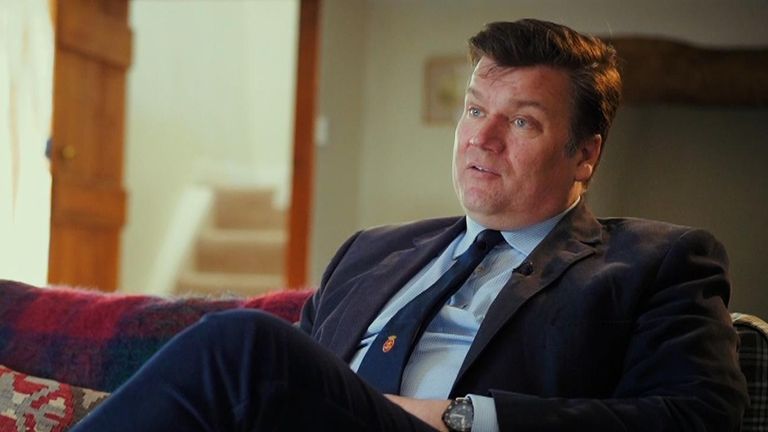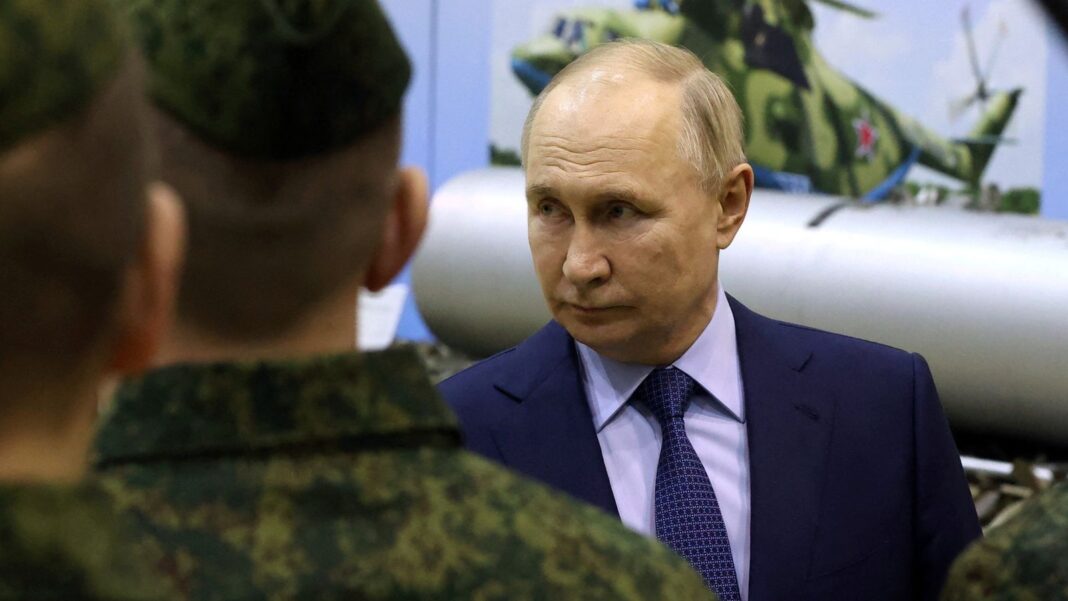Former defence minister Tobias Ellwood has said the West is in “denial” about Vladimir Putin, who “is now more powerful than Stalin”.
The senior Tory MP said he agreed with his colleague James Heappey that the UK should consider sending troops to Ukraine to give training to the armed forces in their war against Russia.
Mr Ellwood said the UK had “done well to support Ukraine” but what’s happening is “very worrying”.
Politics Live: PM vows to secure high-paid jobs for veterans
Vladimir Putin meets military pilots in the Tver region of Russia. Pic: Reuters
“No one doubts that the world’s feeling ever more dangerous, but we dare not contemplate where history is taking us,” he told Sky News.
“Our adversaries, including Russia, particularly Russia, are moving their economies, their industries, to a war footing. But the West is largely in denial.”
He added Putin is “now the most powerful leader in Europe”, comparing him to former Soviet Union leader Joseph Stalin.
“He’s removed all his opposition voices. He’s pivoted his entire economy away from Europe to China and Iran.
“And he’s now more powerful than Stalin and in plain sight. His goal is to emulate his hero, Stalin, not to replicate the old Soviet Union, but the old Russian Empire.”
Please use Chrome browser for a more accessible video player

7:28
‘UK must be prepared for war’
Mr Ellwood was the defence minister between 2017-2019 and before becoming an MP served in the armed forces.
Why are politicians talking about defence so much?

Political correspondent
There’s a fairly simple answer to that.
The last decade has seen war break out on mainland Europe as Russia tests the resolve of the West; instability further afield as China and North Korea become increasingly antagonistic; and old enemies in the Middle East trade blows over Gaza and Palestine.
After a long period of relative peace, huge global powers appear to be squaring up to each other once again.
At the same time, the amount the UK spends on defence as a percentage of its total economy is in the ditch by historical standards – down from 7% in the 1960s, to just over 2% now.
That combination of rising risk and waning resource is why some say we may be repeating the mistakes made in the run-up to the Second World War by not having a credible enough military force to deter a wider conflict.
The crude logic here goes that there’s no point ploughing money into hospitals, roads and schools if they all get blown up in a war that the UK has failed to deter because it didn’t prioritise investment in defence.
That’s what those in the military establishment mean when they say defence and security underpins everything else.
His comments come after Mr Heappey, who resigned as armed forces minister last month, told Sky News that Britain needs to be better prepared for war at a time of growing threats, including by reinvigorating a large “strategic reserve” force of thousands of veterans who could be required to serve again in a national crisis.
In a wide-ranging interview, the outgoing MP for Wells in Somerset also repeated a call for an immediate increase in defence spending to close gaps in capability – such as being able to defend UK airspace from missiles – and eventually to regrow the size of the military.
Read more:
Budget’s lack of new defence spending dismays insiders
DragonFire: The new British military laser that shoots down drones
The government has increasingly come under pressure over the issue, with senior defence figures raising alarm over the shrinking size of the army and for British citizens to be “trained and equipped” to fight in a potential war with Russia.
Follow latest: Moscow accuses British special forces of operating in Ukraine
Fresh concerns were raised last week after Sky News’s security and defence editor Deborah Haynes revealed the government has no national plan for the defence of the UK or the mobilisation of its people and industry in a war.
The government has said it wants defence spending to rise to 2.5% of GDP as “soon as economic conditions allow”. It is at just over 2% at present.
Labour leader Sir Keir Starmer also confirmed his ambition was to boost the defence budget to 2.5% of GDP, if it fits with Labour’s fiscal rules, according to an interview with the i newspaper.
He made the announcement during a trip to a shipyard in Barrow-in-Furness, Cumbria, to see nuclear submarines being built – the first visit of its kind by a Labour leader in more than 30 years.







